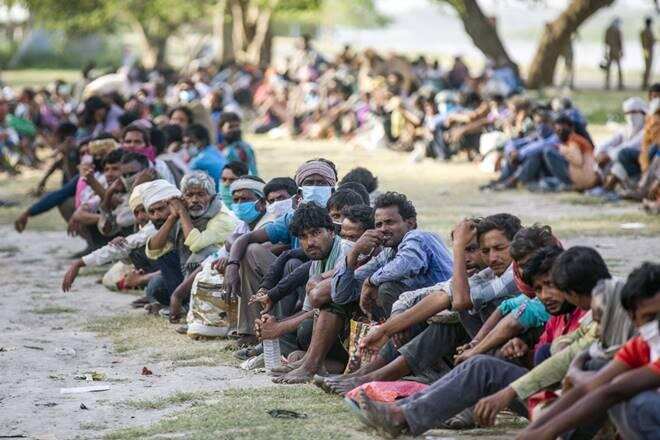This article is written by Sunita who is pursuing a Diploma in Labour, Employment and Industrial Laws for HR Managers from Lawsikho.
Table of Contents
Who are migrant workers? Where are they working? Why are they important for the economy?
In addition to many other factors, India’s economic growth is enabled by the migrant laborers from Uttar Pradesh, Bihar, Jharkhand, Rajasthan, and Madhya Pradesh. Roughly 100 million workers are migrants who are directly or indirectly responsible for 10% of GDP. As per the census of 2011, 37% of the population which is approx. 37 crores, are migrants who have moved to another place as compared to their previous residence for various reasons.
In search of employment, laborers are moving from one state to another state, rural to an urban area, and to industrialized and developed states. 20% of the Indian workforce is of migrant workers, who are an important part of the economy and are playing vital roles in the sectors like MSMEs and other informal sectors and having a good contribution in the GDP of the country. Despite their contribution to the economy, their interest has not been met effectively. In rural areas, farmers are at least getting some benefits from several government schemes such as MNREGA which is giving them some relief but there is no permanent solution to their problems, also there is hardly a law to administer their interest.
Mirant workers are mostly from poor and socially disadvantaged communities such as Dalit, tribal, and minority. Living and working conditions of migrant workers are extremely poor despite their significant numbers. Poor workers are treated with humiliation and people have discriminatory attitudes towards them. This shows us how it is related to our social system. Their working condition is majorly decided by the contractors instead of the government as majorly they are working on contracts and there is no existence of a formal contract. There is hardly any political support or any commitment to improving their condition.
COVID-19 has also exposed the difficulties of the migrant workers. Some of the states like Uttar Pradesh, Haryana, and Rajasthan have made some changes in labor laws so that employing workers will become easy, but these changes are not addressing the problem faced by the migrant laborer.
Studies are showing that the major sectors that are using migrant labors are textile, constructions, mining, rickshaw pulling, small scale industries, fishing and plantation, some them are involved in sex work as well, hotels, restaurants, street vendors, etc. and having a good portion in GDP.
The availability of accurate data is also a big challenge as till now we do not have a trusted figure on circular migrant laborers and because of the unavailability of data, it is difficult to understand how they are incorporated into the economy.
COVID-19 became the major reason which has compelled us to think about the plight of the migrant workers and the major reason behind the condition of the migrant worker is the economic structure of the economy. The major problems faced by migrant workers are lack of accommodation, food, low wages, low standard of living, and no documents or lack of identity proofs, because of which most of the time they are unable to take the benefits of government policies.
COVID and its impact
During the COVID lockdown, they were the most affected community and faced many hardships. Due to the COVID lockdown, many factories and units had to shut down their operations, this led to the loss of job, income, and food shortage. Many of them and their families had to sleep without food. Due to the unavailability of the transport, they had started walking back to their home, in response govt. had to take some important steps for food and transport arrangements like relief camp, shrank special trains, buses, etc. There were many cases of starvation, suicides, deaths in road and rail accidents of migrant workers that came into the picture during the lockdown.
For protecting the interests of migrant workers and to avoid their exploitation, the Inter-state Migrant Workmen Act was passed in 1979. As per this law, only licensed contractors can hire migrant workers and they must submit their details to the state labor office. The contractor must pay them at par with domestic workers and other allowance in case of displacement. This type of law should have strictly adhered and in case of violation immediate action should be taken.
Due to the interstate and rural-urban development gap workers are moving to the more developed states. COVID-19 triggered exodus is a sudden reversal of this cumulative migration of seven decades. The resulting churning is an opportunity for India’s socioeconomic renaissance.
Many states like Bihar, UP, MP, Rajasthan, Uttarakhand, Jharkhand, West Bengal and Odisha faced multiple disaster situations and were struggling to provide healthcare, food, and employment facilities to the returnees. The host states like Maharashtra, Kerala, Tamilnadu, Delhi, and Kerala are trying to minimize the loss of labor and skills and prime for unlocking economic activity.
During COVID-19, states like UP & Bihar with maximum returnee loads, have realized the values of the human assets, and started taking a step in that direction. They are establishing databases, migration institutions, even the government has started thinking about providing or securing better working conditions and social security. Some of the states are also thinking about creating migrant workers’ welfare funds and other poverty eradication schemes.
After the partition of India (1947), when millions of people migrated, now again there is the biggest internal dam burst of the migrant worker as a refugee due to COVID-19. Who is desperately looking for social, health, and economic security, and if India wants to get the benefit for their migrant workforce then the government has to take the necessary steps.
The hardships faced by our migrant workers have awakened society to think about them and immediately address underlying poverty and inequality and to create a system that is disaster-proof. To improve the living and working conditions of migrant workers and their families, the government should have comprehensive strategies for their welfare and need to make relevant changes to occupational safety, health, and working condition related laws or code.
Why is this important and what kind of steps can be taken?
Skill development and employment opportunity
India’s vast migrant labourers would continue to be short-changed, so long as they are under-skilled or not skilled. Fast changing technology has changed the landscape of employment for all, in all the sectors and industries. Migrant workers need the relevant training to take the advantage of these changes. Like Pradhan Mantri Kaushal Vikas Yojana (PMKVY), which is a skill development programme for youth for upgrading their skills that help them to get employment, but there is no scheme for migrant workers. The Ministry of skill development and entrepreneurship should develop a programme targeting migrant workers that matched the industry requirement, this kind of skill upgradation will open the job opportunity for them in home state and destination state as well. Training should be provided based on the coordination of the state having requirements of specific skills. Training of India’s ten crore migrant labourers with industry relevant vocational skills would go a long way in making India a global manufacturing hub. The minimum wage category should be created based on the skills of migrant workers. India is a populous country and will have a younger workforce than other countries in the coming few years, so a skilled workforce will be the strength of the economy.
Health support and minimum wage
The Government must ensure at least basic health care facilities to the migrant workers. Mostly migrant workers are hired by contractors and the law made it mandatory for contractors to provide health care support to migrant workers, but the outcome is not desirable. Also, the migrant worker must be assured of payment of wages and salary, especially in the event when the contractor who hired them suddenly disappears, then it should be the responsibility of the principal employer to make the payment. As per current law, the principal employer has no responsibility to pay salary to contract workers.
Fund for Migrant labour
The govt. should create a fund that covers all the migrant workers like a Provident Fund. Some parameters should be decided based on skills, age, experience, etc. and based on that amount should be fixed and must be deposited in their account. The contribution should be made by the home state, employer state, and center. In case of need, this will help them to run their family and they will not have to face difficulties they have to face in situations like COVID-19.
Women empowerment
In India where the fertility rate has started decreasing comparatively and the youthful and skilled workforce is growing faster than the dependent population, investing in them (migrant workforce) is key. They represent the pool of upgradable and a valuable skill set that can be used in multiple sectors. Empowering the women educationally, socially, economically, and politically is one of the important steps that will help the country to take the advantage of demographic dividend.
These kinds of changes and improvements not only benefit the migrant workers but the government will also be the biggest beneficiary. If the industry is set up then it will create jobs for workers which leads to increasing purchasing power and generates economic activity and increases revenue for the government.
Conclusion
COVID-19 has changed the long held theories about migrant workers and revealed the issues faced by the migrant workers. Despite having a major role in the economy their problems have been ignored for long and they did not get the right and attention they deserve. The migrant workers need a support system that will help them to improve their current condition and ensure them a better future. Policies and reform which have long term effect on their working conditions is what they need right now. If India is to gain a competitive advantage over other nations to transform itself as a manufacturing hub and become self-reliant, then reforms in migrant labour law cannot be ignored.
Students of Lawsikho courses regularly produce writing assignments and work on practical exercises as a part of their coursework and develop themselves in real-life practical skill.
LawSikho has created a telegram group for exchanging legal knowledge, referrals and various opportunities. You can click on this link and join:
 Serato DJ Crack 2025Serato DJ PRO Crack
Serato DJ Crack 2025Serato DJ PRO Crack











 Allow notifications
Allow notifications


